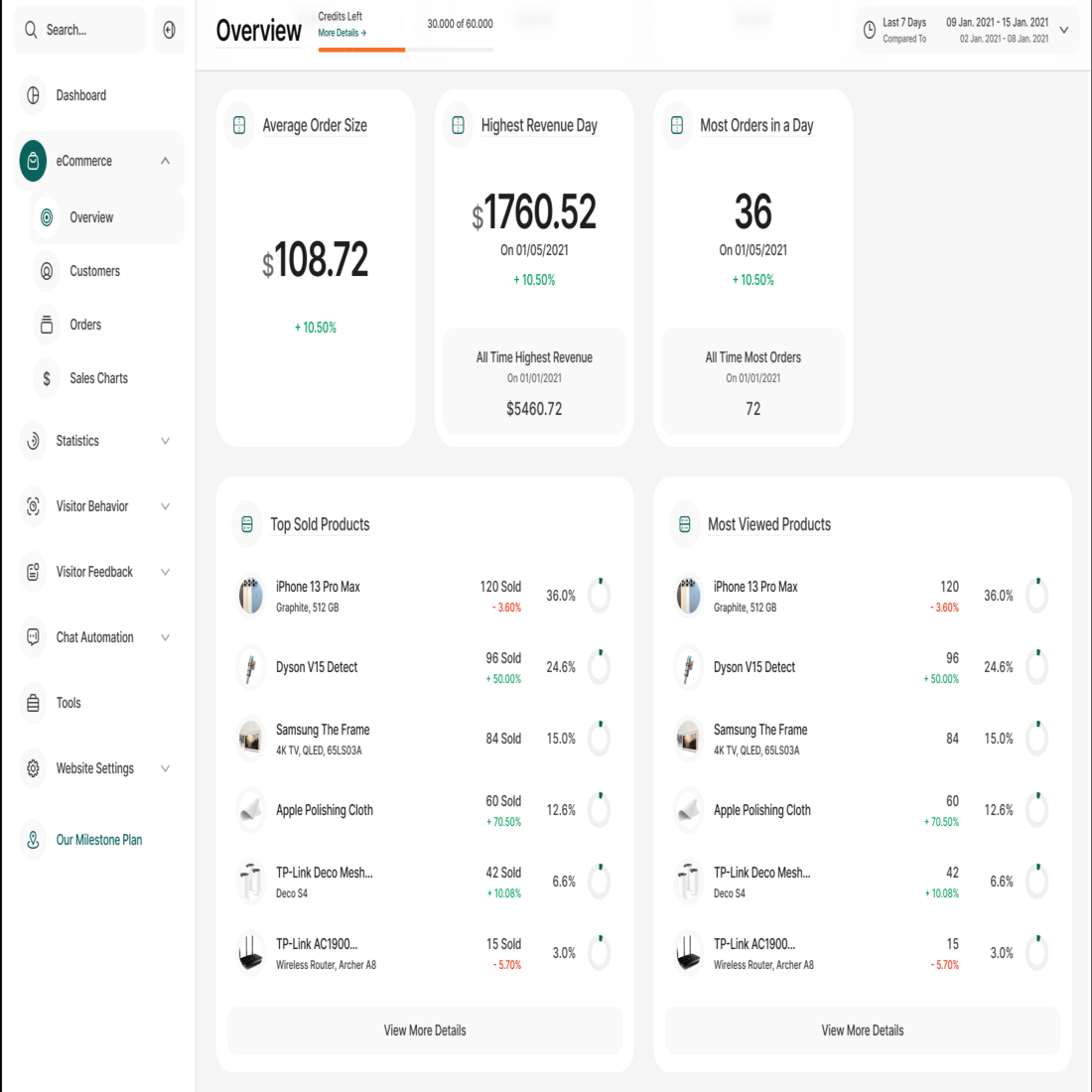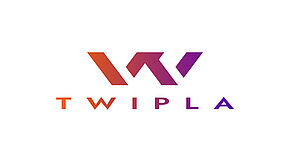
Simon Coulthard February 17, 2024

The right eCommerce analytics tool can act as the business mogal that turns your little lemonade stand into a citric dynasty that Beyoncé names an album after.
These tools are a fantastic companion for any aspiring wallet squeezers. For while the quality of your lemons and price of the drink might seem like the only things that matter, they’ll show you what to do to give customers something else to savour.
Of course, you’ll need to choose the right one.
We’re experts here at TWIPLA, and we’ve compiled our list of the best eCommerce analytics platforms that businesses can use to drive success. So jump straight to the reviews, or scroll on for a leisurely look at the importance of these platforms, the best metrics to track, and the key characteristics that you should look for in this type of website integration.

Understanding the Importance of eCommerce Analytics Software.
In a nutshell, eCommerce analytics tools take the guesswork out of business decisions. These advanced platforms provide actionable insights into customer behavior, product performance, the ability of different digital channels to bring in sales, and overall store effectiveness.
It’s fantastic guidance, and enables eCommerce businesses to build better marketing strategies, improve customer experiences, and increase revenue. Integrate one into your website, and you’ll find that you’re better able to reach your business goals and stay ahead of the competition.
Take a look at growth predictions for the eCommerce analytics market and you’ll get an idea for just how important these tools are for businessses. But with more software options arriving every year, selection is all the more important, and should be done with caution.
Just like shopping for a new gadget or a fancy kitchen appliance, you'll want to consider both the price tag and the features on offer. After all, you don't want to end up with a tool that's more confusing than assembling an IKEA bed when you’d rather be able to lie in it straight out of the box!
Which Parameters or KPIs Should You Look for in an eCommerce Analytics Tool?
That’s a great question, but not something that anyone can say without knowing the specificities of your business. eCommerce metrics are shop-specific; what’s right for you will be a distraction for someone else.
However there are some statistics that are important for anyone in the eCommerce industry. We’ve written elsewhere about the 42 essential KPIs for eCommerce websites, but let’s pull out some that are important for the vast majority of online sellers:
- Conversion rate: the percentage of store visitors who make a purchase.
- Average order value: the average spend by customers per order.
- Customer acquisition cost: the cost to your business of getting a new paying client.
- Customer lifetime value: the revenue expected from a customer over the course of their entire relationship with your business.
- Cart abandonment rate: the percentage of visitors who fill shopping carts with items but don't complete the checkout process.
These five statistics provide powerful insights into sales performance, customer behavior, marketing effectiveness, and the persuasiveness of your store at getting customers to open wallets. And while any analytics tools for eCommerce worth their salt will provide these KPIs, there are other elements to consider when choosing which platform to go for.
Ka-Ching! eCommerce Metrics
Join TWIPLA and never pay a cent. Try out the customizable eCommerce analytics dashboard alongside complete website statistics, behavior analytics tools, and visitor communication features. Have everything you need to effectively guide growth!

Snapshot: Our Four Top eCommerce Picks.
| TWIPLA | Glew | Matomo | Metrilo |
Category | All-in-One Website Intelligence | Multi-Channel Analytics | Open-Source Analytics | Analytics, CRM, Email Marketing |
Privacy Compliance Level | All Laws by Default | GDPR | GDPR | GDPR |
Free Plan | | | Self-Hosters | |
Starts At | $10.39/month | $79/month | $29/month | $119/month |
Free Trial | | On Request | 21-Day | 14-Day |
eComm Stats | | | | |
Heatmaps | | | | |
Funnels | | | | |
Dashboards | | | | |
Key Factors to Consider When Choosing an eCommerce Data Analytics Tool.
Customization
Every eCommerce business is different, making customization and flexibility key factors when selecting which eCommerce data analytics tool to base business success on. In practice, this means that you should look for a platform that has the following features:
- Custom reports: this gives you the ability to tailor analytics reports to the eCommerce metrics and KPIs that matter most to your business.
- Custom dashboards: this gives you the ability to build panels for specific objectives, which can be anything from low level marketing task to top-level business goals.
- Event tracking: this gives you the ability to track specific customer webstore actions that aren’t monitored by default, and to further tailor insights to your business.
- Integration capabilities: this enables you to connect the eCommerce platform with other tools, which will consolidate data and streamline workflows.
- Personalized alerts and notifications: this means that you will only receive the information that is important to your business, and that you’ll be informed about important events or data anomalies.
Real-Time Monitoring
Real-time monitoring enables businesses to get up-to-the minute insights into customer behavior and eCommerce performance analytics. This is vital; customer preferences can change in an instant and technical problems can arrive suddenly without warning.
eCommerce platforms that offer real-time analytics give businesses the ability to make informed decisions on the fly, something that is great for optimizing marketing campaigns, capitalizing on trends, and learning about problems as they happen. As such, it’s important to choose a tool with the following features:
- Immediate reporting: many tools have a delay of up to 48 hours, making the data obsolete before it arrives.
- Live dashboards: look for interactive dashboards that display real-time data on webstore traffic, sales, and other key metrics.
- Instant alerts: choose a tool that allows you to set up alerts for specific events or thresholds, such as website downtime or traffic volume anomalies.
- Dynamic data visualizations: adopt software that displays data in real-time through charts, graphs, and heatmaps. This will enable you to analyze data and pull out the insights you need to make quick decisions.
- Mobile accessibility: ensure that the platform gives you the ability to access real-time analytics on the go so that you can respond quickly to events.
Segmentation
Data segmentation divides data into distinct customer groups based on their shared characteristics and behavior, and is vital for eCommerce data analytics. This can include demographic information, purchase history, browsing behavior, and location. Simply put, segmentation enables you to identify patterns that you can use to base decisions on.
This type of filtering is crucial, enabling eCommerce companies to deliver more relevant and personalized experiences to their customers. It also allows businesses to identify untapped market opportunities, optimize product assortment, and allocate resources more efficiently, with obvious benefits to conversions, sales, and retention.
Customer Support
Customer support is vital for eCommerce analytics users, and not just because software can be capricious. Things can go wrong, every business has different needs, and companies often can’t write training resources fast enough. Ultimately, users need the security that comes from knowing that they’ll have their questions answered, and quickly.
Software reviews sites can be a useful way to gauge the quality of customer support offered by eCommerce analytics platforms. And beyond this social proof, it’s worthwhile to adopt a tool with the following characteristics:
- Multi-channel support: look for companies that offer support through live chat, email, phone, and community portals, and that have a large library of training resources.
- Responsive support: choose a platform with a reputation for providing prompt responses to questions - ideally within 24 hours.
- Knowledgable agents: ensure that the company employs well-trained staff that can give you the accurate and in-depth answers you need.
- Availability within your time zone: ideally, you’ll want to choose a platform that works the same hours you do.
Introducing Your 10 Best eCommerce Analytics Tools.

TWIPLA review: TWIPLA has long been the gold standard for businesses that want a single integration for digital optimization insights. Established back in 2015, users benefit from a complete toolkit of granular statistics, behavior analytics features (think heatmaps, conversion funnels, and session recordings), and visitor communication modules with which to confirm insights and pull in customer feedback.
Our website intelligence solution is now also seller-ready; these businesses can use all the tools listed above, but they also get a cutting edge eCommerce toolkit that will enable them to optimize their product inventories, sales processes, and digital channels.
But crucially, it’s all powered by TWIPLA's cookieless tracking technology. This eCommerce tool is privacy-perfect; it can be used legitimately under all data privacy laws without needing consent from customers and does away with the need for ugly cookie banners and other time-consuming compliance responsibilities.
2. Crazy Egg.
Crazy Egg pricing: Crazy Egg has a 30-day free trial period, with prices then starting from $49 monthly. Plus is by far their most popular option and costs $99 per month, while Enterprise costs $249 per month. But note that subscriptions are billed annually.
Crazy Egg review: Crazy Egg is a cracking option for businesses looking to improve store UX. Their heatmaps are considered some of the best on the market, and their session recordings, A/B testing, and confetti tools make this module a great guide for improving design and sales processes.
This analytics platform is also renowned for being user-friendly once you’ve navigated the somewhat complicated integration process and their customer support is fantastic. And if you want social proof, then their 300,000 active user base should give you the reassurances you need.
Crazy Egg is known for:
- Intuitive data visualization tools for technologically-challenged users.
- Excellent training resources that help people get the most out of the platform.
- Strong data filtering and segmentation functionality.
Recommended for: Small businesses that want strong in-page analytics without any technical heavy lifting.
3. Glew.
Glew pricing: Glew offers a free-forever plan that is ideal for smaller businesses, and free trials are available for the two paid, less restictive plans. And although prices aren't visible on their site, subscriptions start at $79 per month. Plans are billed annually.
Glew review: Glew is a multichannel analytics tool for webstores hosted by WooCommerce, Shopify, and Magento. It provides a quick and easy way to track your store’s performance, and the automated reports and alerts provide the actionable insights businesses need to develop in the right direction.
They’re also clearly passionate about what they do, and they regularly organize some outstanding webinars that you can watch to learn about wider industry trends and how to integrate cutting-edge eCommerce ideas into your decision-making and planning.
Glew is known for:
- Ease of use, with intuitive dashboards, custom reporting, and data visualizations.
- Well-designed onboarding process and highly-responsive customer support.
- Great data export functionality if you need analyze outside of their capabilities.
Recommended for: eCommerce businesses of any size that want a single platform that effectively analyzes data from multiple sources.
4. Kissmetrics.
Kissmetrics pricing: Kissmetric offers free trials and three payment plans, and their pay-as-you-go option gives businesses the ability to customize costs around event usage. Prices start at $199 per month.

Kissmetrics review: Kissmetrics is a customer engagement automation platform. Its focus on real customer actions rather than page views makes it perfect for event-based analytics and Kissmetrics offers a range of features that include conversion funnels, scheduled reporting, and advanced segmentation.
Onboarding and collaborative work can be tricky and learning how to get the most out of it takes time. That said, it’s probably one of the best tracking and leads analysis tools out there at the moment, with powerful visualization options and vital user cohort functionality.
Kissmetrics is known for:
- Easy to understand journey analytics and user behavior.
- Intuitive custom dashboard and reporting construction.
- Noticeable recent design and debugging improvements.
Recommended for: Any B2B company that wants a granular understanding of customer behavior, but particularly those who already have a large lead database.
5. Matomo.
Matomo pricing: Matomo is free for businesses that host data on their own servers. For those that use Matomo's servers, prices start at $29 per month after the 21-day free trial. Costs grow in parallel with website traffic and feature provision.
Matomo review: Matomo sells itself as an “awesome open source and privacy-conscious alternative to Google Analytics”, values that we respect here at TWIPLA. This commitment has attracted many ethically-minded businesses, even if the cluttered interface can be overwhelming for some.
But still, that clutter has purpose. Their platform is also one of the more complete integrations on the market, with website statistics and behavior analytics tools galore. This makes it a solid choice for eCommerce businesses that want deep insights into their customers and purchasing patterns.
Matomo is known for:
- Open-source technology that is accessible for people without technical expertise.
- Solid website performance insights, conversion tracking, and heatmap tools.
- Highly customizable for people prepared to invest the time to learn.
Recommended for: eCommerce businesses that have hosting infrastructure, and who value privacy and data governance.
6. Metrilo.
Metrilo pricing: Metrilo offers a 14-day free trial period. Plans start at $119 per month, and go up to $299. All options include eCommerce analytics, though the Essential plan doesn't include the eCommerce CRM. Users save money by paying annually.
Metrilo review: Metrilo is an all-in-one analytics, CRM, and marketing solution with eCommerce reporting tools that include a real-time dashboard, revenue breakdowns, product performance analysis, and conversion funnels. Other highlights include marketing automation, cart abandonment recovery and a wide range of invaluable data insights.
Ultimately, Metrilo simplifies eCommerce data analysis considerably. Rather than being a passive reporting tool, its smart Assistant acts as a predictive analytics eCommerce oracle that will read the data for you and offer recommendations about the optimization focus areas that will drive the most growth.
Metrilo is known for:
- Intuitive plug-and-play integration suited for people with limited technical knowledge.
- A visual email editor that will create custom, branded emails.
- Customer profile construction based on purchasing histories.
Recommended for: Exclusively eCommerce businesses that want to improve customer retention and grow using a data-driven approach.
7. Mixpanel.
Mixpanel pricing: Mixpanel offers a Free plan, a Growth plan starting at $20 per month, and a customizable option for large enterprises that start at $1,667 per month. Startups less than five years old can have the Growth plan free for one year.
Mixpanel review: Mixpanel is an events-based analytics tool that allows product managers to measure and optimize user engagement in real time. It’s great for tracking customer behavior, with custom event tracking, conversion funnels, and segmentation, as well as custom dashboards and reports.
While it’s a tad pricey as far as eCommerce analytics software goes and events require expertise to activate, the platform is one of the most popular around. It's invaluable for people looking to remove bottlenecks and maximize conversions on their website or store. It’s got an easy-to-use API, and the different charts simplify data analysis considerably.
Mixpanel is known for:
- Powerful diagrams, report panels, and graphs.
- Intuitive customer segmentation and targeting system.
- Tracking mobile and web users under one umbrella.
Recommended for: Marketers and product marketing teams that want more UX oompf in their analytics stack.
8. Supermetrics.
Supermetrics pricing: Supermetrics has a wide range of plans that align functionality with different platforms. Subscription for Monday costs $19 per month, but costs grow significantly for those using multiple data sources or other software.

Supermetrics review: Supermetrics is an analytics and data management platform that pulls data from different marketing platforms into a central hub. This can save a huge amount of time, and enables users to focus better on the tasks that matter: analyzing and pulling insights from their data.
The tool also makes it easy to monitor eCommerce metrics such as total sales, average order value, and the best selling products. Simply put, it’s essential for marketers, and particularly for those who need to holistically track ad spending and performance in one place.
Supermetrics is known for:
- Streamlines analysis, and enables businesses to pull up key data in real time.
- Highly flexible and offers the capability to build custom queries and metrics.
- Particularly useful for driving organic webstore traffic and conversions.
Recommended for: Small teams and eCommerce businesses that need to analyze vast amounts of data from multiple sources.
9. Triple Whale.
Triple Whale pricing: Triple Whale has a free-forever option and three paid subscription levels. Costs start at $400 and go up to $2000 for its dashboard-enabled plan and access to all features.
Triple Whale review: Triple Whale is a relatively new addition to the eCommerce analytics ecosystem, and is only available for Shopify users at the moment. And while it’s one pricey fish, they resolved one key gap in the market by centralizing all eCommerce insights into a single, user-friendly platform.
The company aims to provide online sellers with accurate financial reporting, marketing analytics, and customer data in real time. It has tons of features; and since you can directly input your business costs, it’ll provide a highly accurate profit figure every single day - great for any data lovers out there.
Triple Whale is known for:
- A well designed and highly customizable dashboard.
- Integrates easily into Facebook, Amazon, and virtually any eCommerce software.
- Fantastic hub for pulling in data from multiple sources.
Recommended for: eCommerce businesses that rely on a large number of different online sales channels.
10. Woopra.
Woopra pricing: Woopra offers a free-forver plan that stores data for 90 days. For serious users, paid plans start at $999 per month (after a 14-day free trial).
Woopra review: Woopra's a strong option for product managers looking to understand how customers are engaging with their offerings. It’s cloud-based, which makes it easy to set up and highly scalable, and it’s especially useful for businesses with multiple touch points like email, help desks, and live chat.
This eCommerce reporting software has a fairly steep learning curve and it lacks the customization options available elsewhere. But if you want to understand how to reduce cart abandonment and increase shopping success, the platform is a fantastic resource.
Woopra is known for:
- Provides extensive and highly accurate eCommerce KPIs straight out of the box.
- Great for user journey and customer segmentation analysis.
- Individual customer profile building for granular, multi-channel insights.
Recommended for: Small-to-midsize businesses that want to focus on conversion optimization.
Privacy-Perfect eComm Insights
Our platform can be used legitimately under all laws without consent from customers. So go cookieless, collect more data, and get better insights. Remove your ugly consent banner and confusing compliance responsibilities. It's analytics made easy.
That’s Your Best eCommerce Analytics Tools
Ka-ching!
Adopt one or more of these tools and you’ll start the journey of eCommerce analytics from data to decisions, empowering you to make informed choices that drive growth!
Of course, you’ll need to know which eCommerce metrics to focus on. But we’re experts here at TWIPLA and we’ve got you covered, having already written about the 42 essential KPIs for eCommerce websites as recommended by experts in our global community.
But whatever platform you choose, happy analytics!
Share article
Get Started for Free
Gain World-Class Insights & Offer Innovative Privacy & Security


Stay Updated & Get Inbox Insights
Keep pace with the world of privacy-first analytics with a monthly round-up of news, advices and updates!









